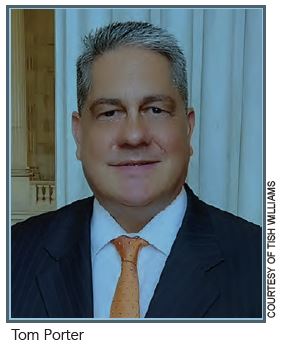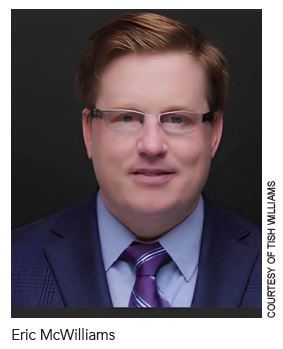By Tishayla Williams
Transitioning from military service to civilian careers presents a complex array of challenges and opportunities. As a veteran working in the health care sector, I’ve encountered significant hurdles, including securing fair compensation, translating my military skills into civilian roles and addressing unique health challenges. These experiences have strengthened my resolve to advocate for systemic support and a deeper understanding of veterans’ needs in the workforce. Through my efforts, I aim to drive meaningful change and improve the transition process for fellow veterans, ensuring they receive the recognition and support they deserve.
Insights from veterans like Tom Porter and Eric McWilliams offer valuable lessons on overcoming these challenges and making impactful contributions in civilian roles. Their experiences highlight the power of leadership, mentorship and advocacy in helping veterans navigate their post-military careers.
 Tom Porter: A Legacy of Leadership and Advocacy
Tom Porter: A Legacy of Leadership and Advocacy
Tom Porter’s career serves as a prime example of how military experience can be effectively translated into civilian roles. With 27 years of service, retiring as a Navy captain, Porter’s journey was profoundly impacted by his experiences during pivotal moments in recent history, including 9/11. Although he did not lead through these events, his unique perspective as a Congressional staff member and Navy Reserve ensign during 9/11 marked a significant turning point in his life and career. The events of that day opened new opportunities for leadership and prompted a career change that ultimately brought him to his current role at Blue Star Families (BSF).
Porter’s transition from being an energy lobbyist to his leadership role at BSF allowed him to continue making a significant impact. At BSF, he oversees programs that support military families, focusing on initiatives such as suicide prevention and family empowerment. His dedication to leveraging his military skills in civilian advocacy roles underscores the importance of integrating military experience into positions that address complex social issues and drive meaningful change.
 Eric McWilliams: Mentorship and Skill Translation
Eric McWilliams: Mentorship and Skill Translation
Eric McWilliams’ career highlights the importance of mentorship in facilitating a successful transition from military to civilian roles. As a veteran leader and advocate, McWilliams emphasizes the value of mentorship programs that help veterans adapt their skills to new environments. His work includes designing and implementing programs that support veterans in navigating their career transitions and achieving success.
McWilliams’ involvement in programs like Wells Fargo’s veteran mentorship initiative demonstrates his commitment to bridging the gap between the military and civilian sectors. He believes that “mentorship is crucial for bridging the language gap between the military and civilian sectors.” This approach not only aids veterans in translating their military experience into civilian success but also contributes to their career advancement and personal growth.
Challenges in the Health Care Sector: A Veteran’s Perspective
Navigating the health care sector as a veteran presents unique challenges that highlight the need for tailored support. These challenges include:
- Equity and Compensation: Veterans often struggle with securing fair pay that reflects their skills and experience. This is particularly relevant in sectors like health care, where compensation may not always align with the value veterans bring.
- Adaptation to New Roles: Translating military medical training and experience into civilian health care settings can be complex. Differences in standards and practices require veterans to adapt their skills effectively.
- Health Challenges: Managing ongoing physical and mental health issues while pursuing a career in a demanding field adds another layer of complexity. Veterans need robust support systems to address these challenges.
Key Lessons for Organizations: Supporting Veterans Across Sectors
Porter’s and McWilliams’ careers offer actionable insights for organizations seeking to support veterans effectively:
- Recognize and Utilize Military Skills: Acknowledge the leadership and expertise veterans bring to roles, leveraging their skills in advocacy and mentorship.
- Implement Comprehensive Mentoring Programs: Develop programs that assist veterans in translating their military experience into civilian success, addressing specific industry needs.
- Address Pay Equity and Career Advancement: Ensure fair compensation and clear career pathways for veterans, particularly in fields like health care where unique challenges may arise.
- Support Health Challenges: Provide resources and accommodations for veterans managing physical and mental health issues in the workplace.
Leveraging LinkedIn for Career Advancement
Veterans should also actively use LinkedIn as a tool for career advancement. Building a strong LinkedIn profile helps veterans connect with potential employers, expand their professional network and highlight their unique skills and experiences. Engaging with relevant groups and participating in discussions can further enhance visibility and open doors to new opportunities.
Strengthening Veteran Support Through Actionable Insights
The careers of Porter and McWilliams underscore the profound impact veterans can have when provided with the right support. Their experiences highlight the importance of leveraging military skills, implementing effective mentorship and addressing career and health-related challenges. For organizations, the key takeaway is to invest in veteran leadership and support systems to build a resilient and dynamic workforce. By adopting these practices and encouraging veterans to use tools like LinkedIn, organizations can harness the full potential of their veteran employees, fostering a more inclusive and equitable work environment.
 Tishayla Williams, an Army veteran and doctoral candidate in business administration, is a health care compliance and DEI expert. She leads initiatives to support veteran transitions and improve recognition for veterans and people of color in the workforce.
Tishayla Williams, an Army veteran and doctoral candidate in business administration, is a health care compliance and DEI expert. She leads initiatives to support veteran transitions and improve recognition for veterans and people of color in the workforce.
Read more articles for the Veteran Community here.


